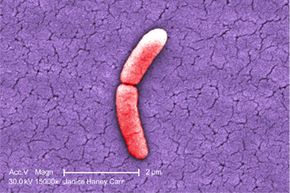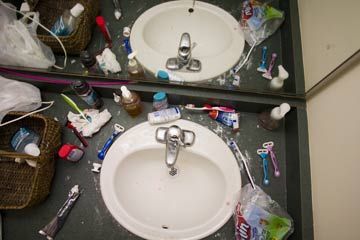Sure, it's nausea-inducing to imagine the insidious germs that slink around a communal shower or crowd the toilet handle of a shared bathroom. But let's be honest: Is it the anything-goes behavior marking most dorm bathroom stories that really causes our stomach to churn? The drunken trysts in shower stalls and the bouts of alcohol poisoning no doubt make for good dorm horror tales. Do they also breed an unhealthy atmosphere?
You bet. Germs are loitering like delinquents on the toilet seat, the bathroom floor, the sink, the soap dispenser -- you name it. That brings us to a larger point: Germs are everywhere. If you were to swab virtually any space -- public or otherwise -- you'd be able to find bacteria, viruses and a host of things we'd consider "dirty." But is a shared space like a dorm bathroom actually more likely to get us sick? And how much should you disinfect, sanitize and fret about your health while using such a space?
Advertisement
Let's start by defining what we're talking about. Depending on how your dorm is set up, you might have a generally communal space with several shower and toilet stalls, plus sinks and counters, ostensibly. You might also have a single shower and toilet, shared by several different rooms if you're living in a suite-style arrangement or something similar. Either way, you're sharing a space with other people and thus introducing lots of germs into the environment. Not just your own, of course, but those of multiple users.
Because these pathogens are everywhere, however, we can't pinpoint a shared bathroom as the filthiest of the filthy. Read on to find out more about why dorm bathrooms may be dirty ... but perhaps not as dangerous as you think.
Advertisement


